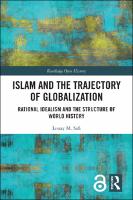Islam and the Trajectory of Globalization
Proposal review
Rational Idealism and the Structure of World History
Abstract
The book examines the growing tension between social movements that embrace egalitarian and inclusivist views of national and global politics, most notably classical liberalism, and those that advance social hierarchy and national exclusivism, such as neoliberalism, neoconservatism, and national populism. In exploring issues relating to tensions and conflicts around globalization, the book identifies historical patterns of convergence and divergence rooted in the monotheistic traditions, beginning with the ancient Israelites that dominated the Near East during the Axial age, through Islamic civilization, and finally by considering the idealism-realism tensions in modern times. One thing remained constant throughout the various historical stages that preceded our current moment of global convergence: a recurring tension between transcendental idealism and various forms of realism. Transcendental idealism, which prioritize egalitarian and universal values, pushed periodically against the forces of realism that privilege established law and power structure. Equipped with the idealism-realism framework, the book examines the consequences of European realism that justified the imperialistic venture into Africa, the Middle East, and Latin America in the name of liberation and liberalization. The ill-conceived strategy has, ironically, engendered the very dysfunctional societies that produce the waves of immigrants in constant motion from the South to the North, simultaneously as it fostered the social hierarchy that transfer external tensions into identity politics within the countries of the North. The book focuses particularly on the role played historically by Islamic rationalism in translating the monotheistic egalitarian outlook into the institutions of religious pluralism, legislative and legal autonomy, and scientific enterprise at the foundation of modern society. It concludes by shedding light on the significance of the Muslim presence in Western cultures as humanity draws slowly but consistently towards what we may come to recognize as the Global Age. The Open Access version of this book, available at http://www.taylorfrancis.com/books/e/9781003203360, has been made available under a Creative Commons Attribution-Non Commercial-No Derivatives 4.0 license.
Keywords
Abrahamic Traditions; modern Islamic Thought; Routledge Open HistoryDOI
10.4324/9781003203360ISBN
9781000483536, 9781032066783, 9781032066790, 9781003203360, 9781000483536Publisher
Taylor & FrancisPublisher website
https://taylorandfrancis.com/Publication date and place
2022Imprint
RoutledgeSeries
Routledge Open History,Classification
History
Middle Eastern history
General and world history
Islam


 Download
Download